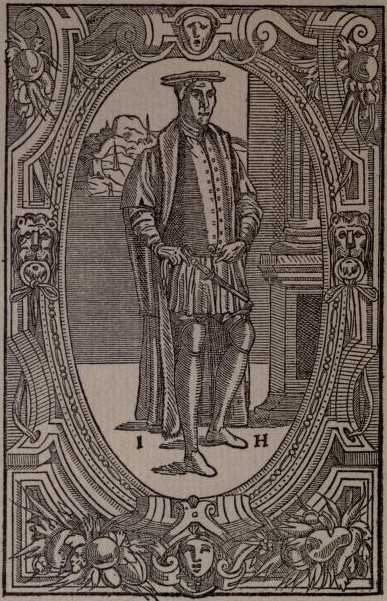“Rome was not built in one day.”
Part I, chapter 11.
Proverbs (1546), Bartlett's Familiar Quotations, 10th ed. (1919)
John Heywood war ein englischer Dramatiker und Musiker der frühen Tudor-Zeit. Eines seiner bekannteren Stücke ist The Play of the Weather. Wikipedia

“Rome was not built in one day.”
Part I, chapter 11.
Proverbs (1546), Bartlett's Familiar Quotations, 10th ed. (1919)
“The loss of wealth is loss of dirt,
As sages in all times assert;
The happy man's without a shirt.”
Be Merry Friends; reported in Bartlett's Familiar Quotations, 10th ed. (1919).
“And also I shall to reueng former hurtis,
Hold their noses to grinstone, and syt on theyr skurtis.”
And also I shall to revenge former hurts,
Hold their noses to grindstone, and sit on their skirts.
Part I, chapter 5.
Proverbs (1546)
“Went in at the tone eare and out at the tother.”
Part II, chapter 9.
Proverbs (1546), Bartlett's Familiar Quotations, 10th ed. (1919)
“One swallow maketh not summer.”
Part II, chapter 5.
Proverbs (1546), Bartlett's Familiar Quotations, 10th ed. (1919)
“Beggars should be no choosers.”
Part I, chapter 10.
Proverbs (1546), Bartlett's Familiar Quotations, 10th ed. (1919)
“Better one byrde in hand than ten in the wood.”
Part I, chapter 11.
Proverbs (1546), Bartlett's Familiar Quotations, 10th ed. (1919)
“Weddyng is desteny,
And hangyng likewise.”
Wedding is destiny,
And hanging likewise.
Part I, chapter 3.
Proverbs (1546)
“She frieth in her owne grease.”
Part I, chapter 11.
Proverbs (1546), Bartlett's Familiar Quotations, 10th ed. (1919)
“It had need to bee
A wylie mouse that should breed in the cats eare.”
Part II, chapter 5.
Proverbs (1546), Bartlett's Familiar Quotations, 10th ed. (1919)
“Hee must have a long spoone, shall eat with the devill.”
Part II, chapter 5.
Proverbs (1546), Bartlett's Familiar Quotations, 10th ed. (1919)
Part II, chapter 5.
Proverbs (1546), Bartlett's Familiar Quotations, 10th ed. (1919)
“Yee have many strings to your bowe.”
Part I, chapter 11.
Proverbs (1546), Bartlett's Familiar Quotations, 10th ed. (1919)
Naught venture naught have. spare to speak spare to speed.
Unknown unkissed. it is lost that is unsought.
As good seek nought, said I, as seek and find naught.
Part I, chapter 11.
Proverbs (1546)
“All a green willow, willow,
All a green willow is my garland.”
The Green Willow; reported in Bartlett's Familiar Quotations, 10th ed. (1919).
“You stand in your owne light.”
Part II, chapter 4.
Proverbs (1546), Bartlett's Familiar Quotations, 10th ed. (1919)
“The grey mare is the better horse.”
Part II, chapter 4.
Proverbs (1546), Bartlett's Familiar Quotations, 10th ed. (1919)
“Let the world wagge, and take mine ease in myne Inne.”
Part I, chapter 5.
Proverbs (1546), Bartlett's Familiar Quotations, 10th ed. (1919)
Part I, chapter 8.
Proverbs (1546), Bartlett's Familiar Quotations, 10th ed. (1919)
“A woman hath nyne lyues like a cat.”
A woman has nine lives like a cat.
Part II, chapter 4.
Proverbs (1546)
Variante: A woman hath nyne lyues like a cat.
“Ye can not sée the wood for trées.”
You cannot see the wood for trees.
Part II, chapter 4.
Proverbs (1546)
“The mo the merier, we all daie here and sée
Ye, but the fewer the better fare (said hée)”
The more the merrier, we all day hear and see
You, but the fewer the better fare, said he.
Part II, chapter 7.
Proverbs (1546)
Part I, chapter 11.
Proverbs (1546), Bartlett's Familiar Quotations, 10th ed. (1919)
“Ye set circumquaques to make me beleue
Or thinke, that the moone is made of gréene chéese.”
You set circumstances to make me believe
Or think, that the moon is made of green cheese.
Part II, chapter 7.
Proverbs (1546)
“It is better to be
An olde mans derlyng, than a yong mans werlyng.”
It is better to be
An old man's darling than a young man's warling.
Part II, chapter 7.
Proverbs (1546)
Variante: It is better to be
An olde mans derlyng, than a yong mans werlyng.
“We both be at our wittes end.”
Part I, chapter 8.
Proverbs (1546), Bartlett's Familiar Quotations, 10th ed. (1919)
Part II, chapter 4.
Proverbs (1546)
Variante: A penny for your thought.